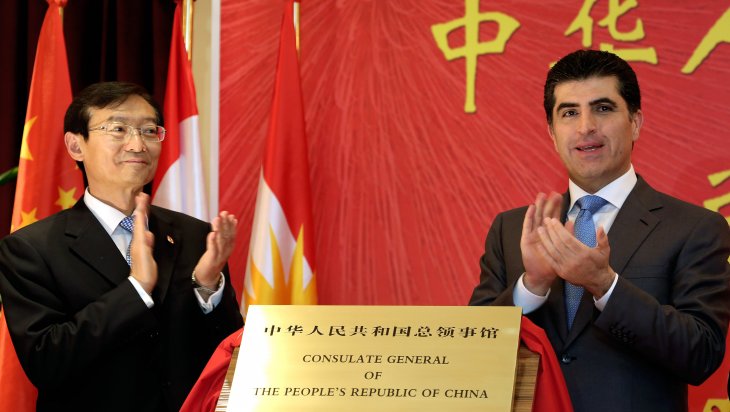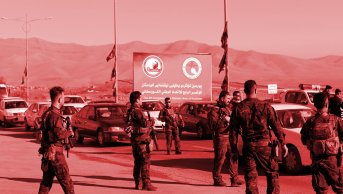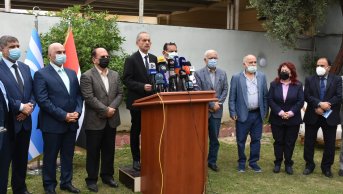Growing Chinese Influence in the Kurdistan Regional Government in Iraq

China, which has strengthened its presence with significant investments in the energy sector in Iraq especially since 2007 after the US invasion of Iraq, has endeavored to bring its current presence to a more effective position following the announcement of the Belt and Road Initiative in 2013. In this sense, China has become one of the main actors in the Iraqi economy today. In 2020, Iraq is the third-largest supplier of China with 60 million tons of crude oil exports per year, after Saudi Arabia and Russia. Additionally, according to 2019 data, China's increase in oil imported from Iraq by 16% has been an important indicator in terms of showing the critical role of energy in China-Iraq relations. Chinese companies have an important share not only in the supply of crude oil but also in electricity production in Iraq. Wassit Thermal Power Plant, which was established in 2010 and located in the Wassit province of Iraq, is owned by the Chinese company Shanghai Electric Group and it meets 20% of Iraq's current electricity needs and 70% of the electricity needs of the capital Baghdad with a daily electricity generation of 56 million megawatts/hour. China's steps in Iraq gained momentum in the Kurdistan Regional Administration (KRG) in Iraq, with the opening of its consulate general in Erbil in 2014.
China tried to reinforce these steps, especially with commercial investments and cultural collaborations. China has also strengthened its presence in a quiet but effective manner in a geography that has become a competitive area of different countries and where these rivalries can often evolve even into armed struggle.
The Beginning of Bilateral Relations
In addition to China's investments in Iraq under the central government following the US occupation, relations with the KRG did not develop as rapidly as with Baghdad. The visit of the PUK leader Jalal Talabani to Beijing in 2003 is described as the first serious contact of Kurdish politicians in Iraq with China. However, the fact that Talabani made his visit to Beijing as a member of the temporary administration established in Iraq showed that the visit was not directed towards the Kurdish region, but rather covering the steps that China will take towards Baghdad. The basis of the relations between China and the KRG was mainly due to the opening of the Chinese Consulate General in Erbil in 2014. At the opening ceremony, which was attended by the KRG Prime Minister Nechirvan Barzani at that time, Barzani emphasized that China's opening of a consulate in Erbil is the beginning of cultural, economic, and political relations with the KRG. It is also very important that this diplomatic step taken by China towards the KRG comes one year after the Belt and Road Initiative was announced to the world public opinion. While China achieved serious financial gains by accelerating its investments with the diplomatic relations it established in the Middle East with the Belt and Road Initiative, it did not want to fall behind from the gains of relations with the regional administration in northern Iraq. On the other hand, 2014 has a very important meaning as it is one of the periods in which the terrorist organization ISIS increased its power the most in the region. Despite the massive destruction brought by ISIS and the withdrawal of diplomatic missions of many countries, especially in northern Iraq, China opened a consulate in Erbil and gave the KRG a "foul-weather friendship" message. In this way, China aimed to build the foundations of bilateral relations on solid ground, especially in the new period when economic and cultural contacts will be increased.
However, even though this positioning by the Chinese has certain messages and advantages in this new period, it also has important fragility at many points. Just before the Chinese presence in the KRG is addressed, it would be appropriate to emphasize these vulnerabilities. First of all, it should be underlined that China does not lean towards any separatist movement in foreign policy. This perspective put forward by China is undoubtedly closely related to the policies towards Taiwan and the Xinjiang Uyghur Autonomous Region (East Turkistan). After the Ministry of Foreign Affairs of the People’s Republic of China announced that the KRG would hold an independence referendum in 2017, He emphasized that they do not support the referendum in question. They are in favor of "unity and territorial integrity of Iraq". This clear attitude of China against the KRG's independence initiative causes today's bilateral relations to be built with a negative historical memory.
Despite all this historical memory, the interests of the parties have enabled the bilateral relations to develop significantly since 2014 and especially to strengthen the influence of China in the KRG. Iraq has a critical importance for China's Belt and Road Initiative, primarily due to its energy reserves and its strategic location towards the Persian Gulf and the Strait of Hormuz, where it transports energy. On the other hand, Iraq has geostrategic importance for the line announced as the "Silk Road Economic Belt." This will form the highway line of China's Belt and Road Initiative and also for the line that reaches Europe via Turkey, Iraq, Iran in the Middle East. Iraq shares this importance with the KRG, which is a part of Iraq in the north of the country. Therefore, in addition to unilateral policies towards the central government, China aims to strengthen its relations with the KRG. The KRG controls the oil imports of important reserves in the region. In this sense, China, which got the necessary planning permission in 2019 to move the consulate in Erbil to a wider area, is making initiatives with the KRG to make progress especially in terms of education and culture. Within the scope of the steps taken in this context, a department to teach Chinese was opened in the Salahaddin University in Erbil in 2019. In response to this step, that plans were made to open a Kurdish-language department at Beijing University was shared with the public.
Mutual Economic Interests
The development of relations with China is directly related to the economic interests of the KRG. In 2014, when China opened its consulate in Erbil, attempts to increase oil imports to China from oil fields under KRG control gained momentum significantly. Over 2 million barrels of oil per month are imported into China by the KRG through Ceyhan Port. Although this number is a small amount for China, the world's largest oil importer, which imports more than 500 million tons of crude oil annually, it means a significant economic income for the KRG, which is largely dependent on the oil it realizes through Ceyhan Port in its economy.
The KRG has an obligation to share the monthly income of 250 thousand barrels with Baghdad in the oil exports realized within the scope of the agreement made with the central government in 2019. However, the KRG, which does not fulfill this obligation, does not deliver its oil revenues to the central government, and in return, the central government cuts its budget for the KRG. This situation increases the importance of oil imports of China from the KRG. The KRG’s source of income is almost limited by the income it receives from oil imports as a result of its problems with Baghdad. Hence, from the KRG’s point of view, China is one of the leading markets in the import of oil controlled by the KRG due to its commitment to oil.
One of the basic dynamics of the relations between China and the KRG is the investments that China has made mostly in Erbil to strengthen its presence in the KRG. During the meeting of the KRG Prime Minister Mosrour Barzani and the Consul General of China in Erbil, it was underlined that China is very willing to invest in the KRG. As one of the important developments in this scope, in September 2020, it was announced that a Chinese company made an offer to the Erbil Investment Directorate to build a $ 5 billion "touristic city" in Erbil. Making a statement on the subject, Erbil Investment Manager Saman Arab emphasized that the project, which is planned to be built on a very large land, is at the stage of "land allocation" and that they hope to lay the base soon. It was also stated that the project will offer eight thousand new job opportunities in the city. On the other hand, another Chinese company laid the foundations of one of the largest shopping centers in the city in Erbil in January 2021. The Consul General of China in Erbil, who attended the groundbreaking ceremony, emphasized that the project will carry the economic and commercial cooperation between the two parties to higher levels.
At a time when the KRG needs more investment to increase and diversify its income sources, the willingness of Chinese companies to invest in the region offers China many opportunities in the region in the coming period. The point that needs to be underlined is the effort of the Chinese administration to establish these opportunities not only through investments but also through soft power elements. The fact that the coronavirus outbreak has deeply shaken the health infrastructures of Middle Eastern countries and it leads to extremely negative pictures on economies created an important area for China to become the “savior” of Middle Eastern countries during the epidemic period. With the opportunity brought by the epidemic, China has delivered aid to Iraq since the first day of the epidemic to improve its relations with Iraq. China, which sent medical teams to Iraq in the first place, later sent medical equipment with the words "a friend in need is a friend indeed". Furthermore, China-backed laboratories have been established in Baghdad to speed up case detection. All these aids made by China to Iraq were not limited to the central government, but also aid to the KRG started from the first moment. When the aid reached Erbil Airport, the minister of health of the KRG and the consul general of China, who received the aid, stated that "China is the KRG's friend in difficult times".
How Much Is Possible Against the USA?
The emphasis on "foul-weather friend" repeated in the KRG is important in portraying China's foreign policy perspective towards the region. As the primary competitor of the USA in global competition, China is trying to strengthen its presence in the KRG where the American administration is the leading actor in its politics, economy, and security structuring. Increasing Chinese presence in response to the US power in the Middle East in general, and more specifically in Iraq and the KRG will undoubtedly cause more serious conflicts of interest in the future. However, considering that the US administration has a wide area of influence in the region in particular for the KRG, it is a serious question mark how much China can exist in this sphere of influence only with investment instruments and soft power elements. Although there is an emphasis on a foul-weather friend, it is controversial how long China can maintain its friendship with the KRG without its military power in geography where terrorist organizations such as Iraq can still pose a serious threat. From the Pentagon budget, 250 million dollars of aid was made to the Peshmerga in 2020, and 166 million dollars of aid was planned to be made in 2021. In this context, thousands of military vehicles and ammunition were delivered to the Peshmerga by the US administration in the past year. Even this aid alone draws the limits of how close the KRG can get to China in opposition to the USA, to which it owes its security in the region. Moreover, after the Qasem Soleimani era, the US strengthening its military bases in the KRG and bringing the relocation of the embassy in Baghdad to Erbil on the agenda will further strengthen the presence of the USA, which is the "insurance" of the KRG presence in the region.
Above all, China has taken a very clear stance against the possibility of independence of the KRG and has shown that it will not support the independence step that the KRG will take against the territorial integrity of Iraq. This negative attitude from China politically becomes a very important power factor for the USA to keep its influence on the KRG stronger against China.
On the other hand, with the presidency of Joe Biden in the USA, the question of what kind of transformations the US administration may experience in Iraq policy is extremely important. The close relations that Biden established with the KDP within the KRG and especially personally with Masoud Barzani during the period when Biden was the Vice President may bring along new steps that will limit the influence that China wants to create in the north of Iraq. The commitments and positive policies that Biden will provide to KRG against the central government may strengthen Erbil's position as the "base" of the USA in Iraq, as well as restrict the expected relations with China.
As a result, it can be said that the KRG will try to be cautious between the two parties as an actor aware of the global competition between the USA and China in the short and medium-term and to gain advantage from Chinese investments as much as possible. This will be a factor that can facilitate China's strengthening of its presence in the KRG and allow it to find more space for action. However, the power of the American administration over the politics, economy, and security of the KRG will draw the line with the KRG's relations with China in the long-term. This situation will cause China to question how long it can maintain its presence in the KRG with only the "money" factor away from political and military existence and will force the KRG side to choose between two global actors. When research is made based on today's atmosphere and conditions, it can be said that the current US influence will be enough to keep the KRG in its block. Therefore, despite the existence of a US that has penetrated all of the KRG, it seems quite difficult for China to become a dominant power in the region with investments and cultural cooperation in the long-term.





